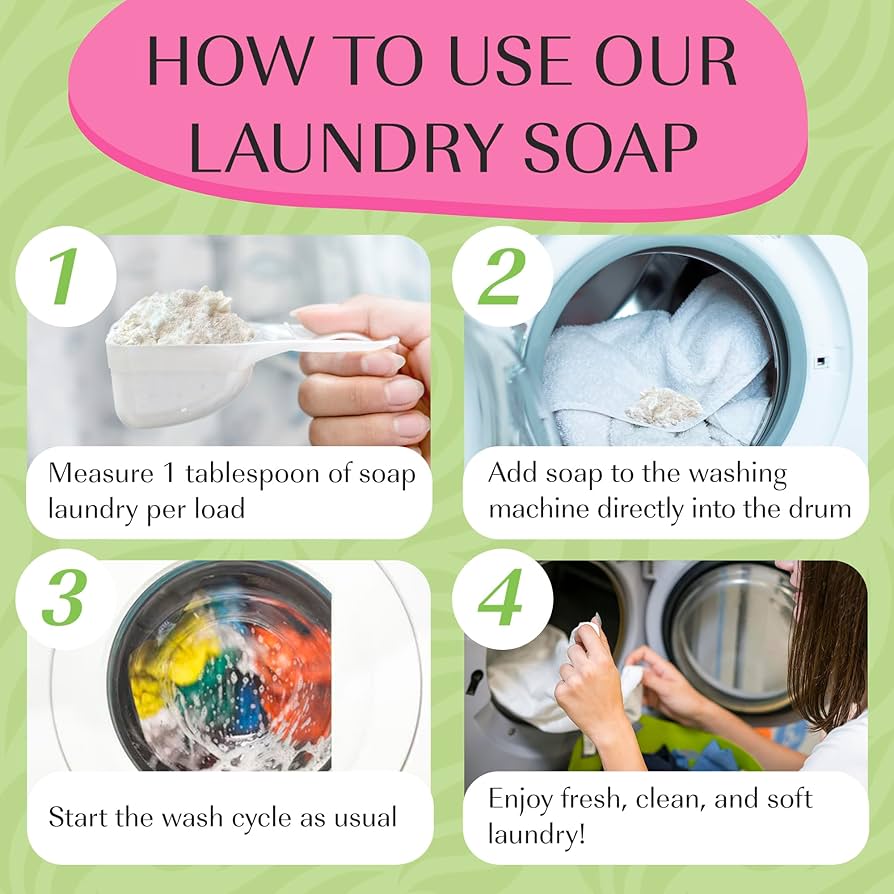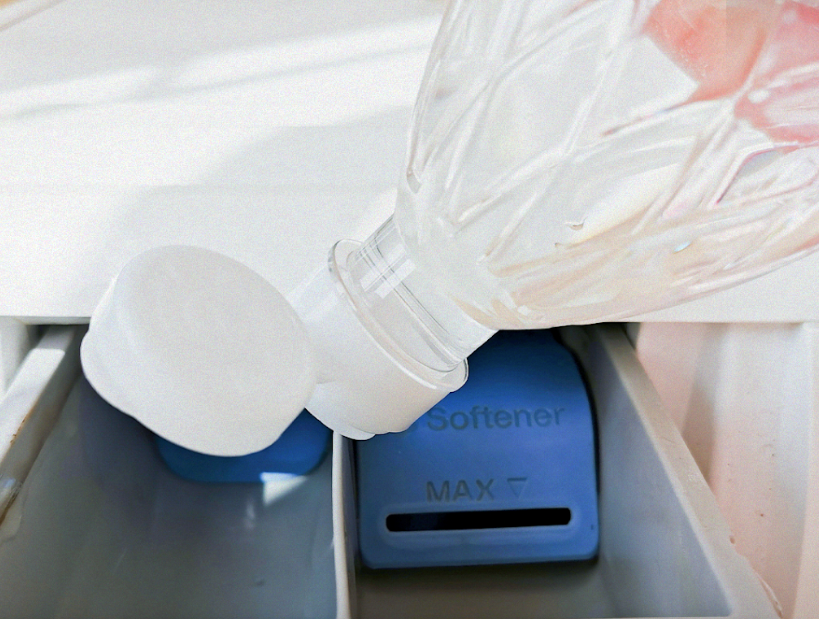Have you ever found yourself out of dish soap and wondered, “Can I wash dishes with laundry detergent?” It’s a common question that pops up when you’re in a pinch.
But before you reach for that laundry detergent bottle, you need to know what happens when you use it on your dishes. Using the wrong soap can affect your health, taste, and even your dishes. Keep reading to discover the surprising truth about laundry detergent and dishwashing, so you can make the safest and smartest choice for your kitchen.

Credit: www.amazon.com
Laundry Detergent Vs Dish Soap
Many wonder if laundry detergent can replace dish soap. Both clean, but their uses differ greatly. Knowing their differences helps keep dishes safe and clean. Let’s explore how laundry detergent compares to dish soap.
Chemical Composition Differences
Dish soap contains mild surfactants made for grease and food residue. It has ingredients safe for skin and easy to rinse off. Laundry detergent has stronger chemicals to remove tough stains and dirt from fabrics. It often includes enzymes, brighteners, and fragrances not meant for dishes. Some ingredients in laundry detergent can leave residue or harm skin after dishwashing.
Cleaning Power Comparison
Dish soap cuts grease effectively and rinses clean quickly. It works well on food particles and oils without leaving film. Laundry detergent cleans fabric stains but may not rinse off dishes fully. It can create foam that is harder to remove from plates and glasses. Using laundry detergent on dishes risks leaving harmful chemicals behind, even if it removes dirt.
Potential Risks Of Using Laundry Detergent
Using laundry detergent to wash dishes might seem like a quick fix. It can clean, but it carries risks that many do not consider. These risks affect health and the quality of your dishes. Understanding these dangers helps you make safer choices in your kitchen.
Health Hazards
Laundry detergent contains chemicals not meant for ingestion. These chemicals can cause stomach pain, vomiting, or allergic reactions. Even small amounts left on dishes can be harmful. Skin contact with these chemicals may cause irritation or rashes. Laundry detergents often contain strong fragrances and enzymes that can trigger asthma or breathing issues. This makes them unsafe for cleaning items used to eat or drink.
Residue And Taste Issues
Residue from laundry detergent can remain on dishes after washing. This residue tastes bitter and unpleasant. It can also mix with food and drinks, ruining flavors. Some detergents do not rinse off easily, leaving a slippery feel. This residue may also cause stains or cloudiness on glassware. Using products made for dishes avoids these problems and ensures a clean, safe result.
When Laundry Detergent Might Be Used
There are moments when you might find yourself without dish soap but with laundry detergent on hand. Knowing when it’s appropriate to use laundry detergent for washing dishes can save you from stress and inconvenience. However, it’s important to understand the right circumstances and precautions to avoid any harm to your health or your dishes.
Emergency Situations
Imagine you’re camping or facing a sudden run-out of dish soap at home. Laundry detergent can serve as a temporary substitute in these emergencies. It helps remove grease and food residue when no other option is available.
But remember, laundry detergents are not designed for dishes and often contain stronger chemicals. Using them occasionally and rinsing dishes thoroughly is key to avoiding unwanted residue or taste. Would you risk using detergent just to get through a tough spot?
Proper Dilution Methods
If you decide to use laundry detergent, diluting it properly is crucial. Adding a small amount—about a quarter teaspoon—to a basin of warm water can reduce its harshness. This mild solution can help clean your dishes without leaving excessive soap behind.
Always rinse dishes multiple times with clean water afterward. This step ensures no detergent traces remain that could affect your health or taste buds. Have you ever tried this approach when in a pinch, and how did it work out for you?

Credit: puracy.com
Safe Alternatives For Dishwashing
Choosing safe alternatives for dishwashing protects your health and the environment. Some products may harm your skin or leave toxic residues. Safe options clean dishes effectively without harsh chemicals. These alternatives are gentle and eco-friendly. They also reduce the risk of damaging your dishes or dishwasher.
Natural Cleaning Agents
Natural cleaning agents work well for washing dishes. They break down grease and food particles without harsh chemicals. Common natural agents include:
- White vinegar – cuts grease and removes odors
- Baking soda – scrubs gently and neutralizes stains
- Lemon juice – fights bacteria and leaves a fresh scent
- Castile soap – a plant-based soap safe for dishes
These ingredients are safe for sensitive skin and biodegradable. They keep your kitchen fresh and clean.
Homemade Dish Soap Recipes
Making your own dish soap saves money and avoids chemicals. Simple recipes use common household ingredients. Here is an easy recipe:
| Ingredient | Amount | Purpose |
|---|---|---|
| Liquid castile soap | 1 cup | Base soap for cleaning |
| Water | 1 cup | Dilutes soap for easier use |
| Baking soda | 1 tablespoon | Helps remove grease |
| Essential oil (optional) | 10 drops | Adds fragrance and antibacterial power |
Mix all ingredients well in a bottle. Shake before each use. This soap cleans dishes effectively and smells pleasant.
Tips For Effective Dishwashing
Washing dishes effectively can save you time and frustration, especially if you’re using unconventional cleaning agents like laundry detergent. The key lies in understanding how to maximize the cleaning power of whatever detergent you choose, along with proper technique. Let’s dive into practical tips that will help you get your dishes spotless without extra hassle.
Water Temperature Matters
Hot water helps break down grease and food residues faster than cold water. Aim for water that’s comfortably hot to the touch but not scalding, as extremely hot water can damage delicate dishes or cause burns. If you’re using laundry detergent, hotter water can also help dissolve it better, reducing leftover residues on your plates and utensils.
However, if you’re washing delicate glassware or plastics, slightly cooler water might be safer to avoid warping or cracking. Have you noticed how some spots linger despite scrubbing? Adjusting your water temperature might be the simple fix you need.
Scrubbing Techniques
Effective scrubbing isn’t just about applying more force. Use a sponge or brush with the right texture for your dishes—soft for non-stick or glass, and tougher for pots and pans. Circular motions combined with gentle pressure often work better than harsh scrubbing back and forth.
Try soaking heavily soiled dishes for a few minutes before scrubbing. This softens stuck-on food and reduces the effort needed. Have you tried letting your dishes soak? It might change how clean they get on your first pass.
- Start scrubbing from the edges inward to catch all food particles.
- Rinse your sponge or brush regularly to avoid spreading grime.
- Use separate scrubbers for greasy pans and delicate dishes to prevent cross-contamination.

Credit: www.nytimes.com
Frequently Asked Questions
Can Laundry Detergent Safely Clean Dishes?
Laundry detergent is not designed for dishes. It may leave harmful residues and cause stomach issues if ingested. Use dish soap for safe and effective cleaning.
What Happens If I Use Laundry Detergent On Dishes?
Using laundry detergent on dishes can leave toxic residues. It may cause skin irritation and is unsafe to consume. Avoid using it to prevent health risks.
Is Laundry Detergent Effective For Washing Dishes?
Laundry detergent is not effective for dishes. It lacks grease-cutting agents found in dish soaps. It may leave dishes dirty or unsafe for use.
Can Laundry Detergent Remove Grease From Cookware?
Laundry detergent can remove some grease but is not food-safe. It might leave harmful chemicals on cookware surfaces. Use dish soap for cleaning cookware safely.
Conclusion
Using laundry detergent for dishes isn’t the best idea. It’s not designed for that. Dishes might not get cleaned properly. Plus, it could leave harmful residues. Stick to dish soap for washing dishes. It’s safer and more effective. Laundry detergent can be harsh on your hands.
And it might damage your dishes over time. Dish soaps are made to fight grease and food particles. They rinse off easily. Keep your kitchen routine safe. Choose products meant for the task. That way, your dishes stay clean and your health protected.

Home Improvement Expert & Senior Writer at HomeFixio
Reed Atwood is a seasoned home improvement expert with a passion for transforming everyday living spaces into functional and stylish havens. With years of experience in DIY projects, renovations, and home upgrades, Reed brings a wealth of knowledge to HomeFixio. As a senior writer, he provides readers with practical, easy-to-follow guides, expert tips, and innovative solutions for every room in the house. His goal is to empower homeowners to tackle their projects with confidence, ensuring both quality results and a rewarding experience.
